
On March 4, the Carnegie Museum of Art’s Hall of Sculptures transformed into a center for feminist action. Natural light flooded the room; six large tables were assembled in the middle of the cavernous hall, anchored by a small cart in the center with books and colorful folders full of information packets.
Participants, from across the gender and age spectrum, wore nametags stating their preferred pronouns; conversations floated in the echoing hall, as they gathered around their laptops.
They were participating in an Art+Feminism edit-a-thon. Art+Feminism is a national organization that aims to close the gender gap in Wikipedia’s store of information related to art.
The movement was sparked after The Wikimedia Foundation released information showing that barely 10 percent of Wikipedia contributors identified as female. Artists who have pages on the internet database are largely reflective of the identity of the average Wikipedia editor, a coding-savvy white male.
Art+Feminism and the Wikimedia Foundation took action, speculating that if the editor base was more diverse, the content and populations represented on the database would also be more diverse.
As a result, Wikipedia took steps to make the structural aspects of its website much easier to edit, by offering a new visual editor option. By making the technology more accessible, pop-up edit-a-thons became easier, since a quick tutorial in editing would be enough to get most people started.
Since Art+Feminism’s inception in 2014, the intersectional feminist collective has spurred more than 300 edit-a-thons across six continents.
The event was the second Art+Feminism edit-a-thon hosted in Pittsburgh. In 2016, the events were hosted by Carnegie Mellon University at its STUDIO for Creative Inquiry, while the University of Pittsburgh held a sister edit-a-thon at the Frick Fine Arts Library.
Angela Washko, a professor at CMU and feminist visual artist, organized the edit-a-thon at the STUDIO for Creative Inquiry last year. She also participated in Brooklyn’s edit-a-thon and organized an edit-a-thon at the University of California San Diego. This year she co-organized the event and taught tutorial sessions for new Wikipedia editors.
As an artist who is involved in a scene at the intersection of technology and internet-based practices, Washko is hyper-aware of the importance of feminist representation online and in academia.
“In any archive, be it Wikipedia or any database, it’s really important to consider who is deemed worthy of being canonized,” said Washko.
Washko’s co-organizing partner, Hannah Turpin, echoed that sentiment with an eye toward the museum itself.
“Museums are a part of perpetuating canons and creating new canons,” said Turpin, “Who are we talking about? Reading about? Showcasing in our galleries?”
Turpin, the curatorial assistant for contemporary art and photography at the CMOA, helped coordinate the first edit-a-thon, hosted at the Elizabeth A. Sackler Center for Feminist Art at the Brooklyn Museum two years ago.
Participation in these edit-a-thons just makes sense to Turpin, as her master’s work centered around restoring the narrative and combating the erasure of gender-nonconforming and trans soldaderas in photographs taken during the Mexican Revolution.
Turpin emphasized how important it is for feminist discussion to flow from these spaces and at large institutions like the CMOA, which hold cultural power.
“Because this is an open-door public event, we can engage passersby in feminist thought and art,” said Turpin, “That confrontation is important.”
Washko and Turpin were aided by the Carnegie Library Main Branch, University of Pittsburgh libraries, Carnegie Museum of Art and CMU. Pitt and CMU students helped curate the list of artists who needed a profile or whose profiles needed improvement.
Prior to the event, the list was handed off to the librarians who found books and created packets of information regarding as many artists as possible. This list was then digitally distributed to editors on the day of the event, but participants were also encouraged to contribute artists of their own.
Participant and CMU student Char Stiles expressed approval of the artists selected. “The list is more directed, especially towards women in art and women featured at the CMOA,” said Stiles. “It’s really helpful to have the library leverage their resources to help document these artists.”
As Wikipedia tightens up its notation and citation rules, it is becoming a more valid source of factual information. As an easily accessible database of knowledge, the opportunity to make the Wikipedia articles more egalitarian is crucial and central to the edit-a-thon’s mission.
Turpin emphasized that the organizers of the edit-a-thon care about the takeaway above all.
“If the participants leave here and realize they can make a big difference by editing in their spare time, that’s great,” Turpin said. “This is something anyone can do.”


















